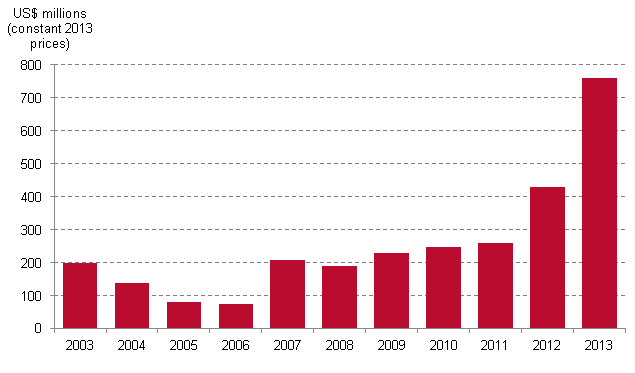ODA to basic nutrition from DAC donors increased between 2012 and 2013
Aid to basic nutrition* from DAC donors stood at US$760 million in 2013, representing a 77% increase from 2012 levels. Overall official development assistance (ODA) to basic nutrition increased year on year between 2008 and 2013.
The United States (US$278 million), Canada (US$169 million) and Japan (US$109 million) were the top three DAC donors of basic nutrition ODA in 2013. The core driver in the overall rise from 2012 to 2013 was an increase in disbursements from the US (increasing by a factor of 4), Japan (increasing by factor of 3) and the UK (increasing by a factor of 1.6).
The top three country recipients of basic nutrition ODA from DAC donors in 2013 were Ethiopia (US$48 million), Yemen (US$47 million) and Mozambique (US$31 million). The largest regional recipient of basic nutrition ODA in 2013 was South of Sahara at US$556 million (59% of total basic nutrition ODA).
Download data in Excel and CSV format
Notes
*Basic nutrition ODA is defined as ODA reported to the Organisation for Economic Co-operation and Development (OECD)’s Development Assistance Committee (DAC) under purpose code 12240 (basic nutrition). All figures are in US$, 2013 constant prices; figures are gross disbursements to all eligible recipients from DAC donors reporting to the OECD DAC Creditor Reporting System (CRS). Data for 2014 will be released in December 2015.
Basic nutrition encompasses direct feeding programmes (maternal feeding, breastfeeding and weaning foods, child feeding and school feeding); determination of micro-nutrient deficiencies; provision of vitamin A, iodine, iron etc; monitoring of nutritional status; nutrition and food hygiene education; and household food security.
Related content
Priorities for the UK’s incoming Secretary of State Alok Sharma
As Alok Sharma takes office as Secretary of State, DI's Amy Dodd sets out key priorities for the UK and its global development agenda.
From review to delivery on the Global Goals – what should the immediate priorities be for the UK government?
On 26 June, the UK government published its Voluntary National Review measuring delivery against the Global Goals - but does it accurately capture progress?
Three priorities for the High-level Political Forum 2019
DI Director of Partnerships & Engagement Carolyn Culey sets out three key priorities for closing the gap between the poorest and the rest at HLPF 2019
